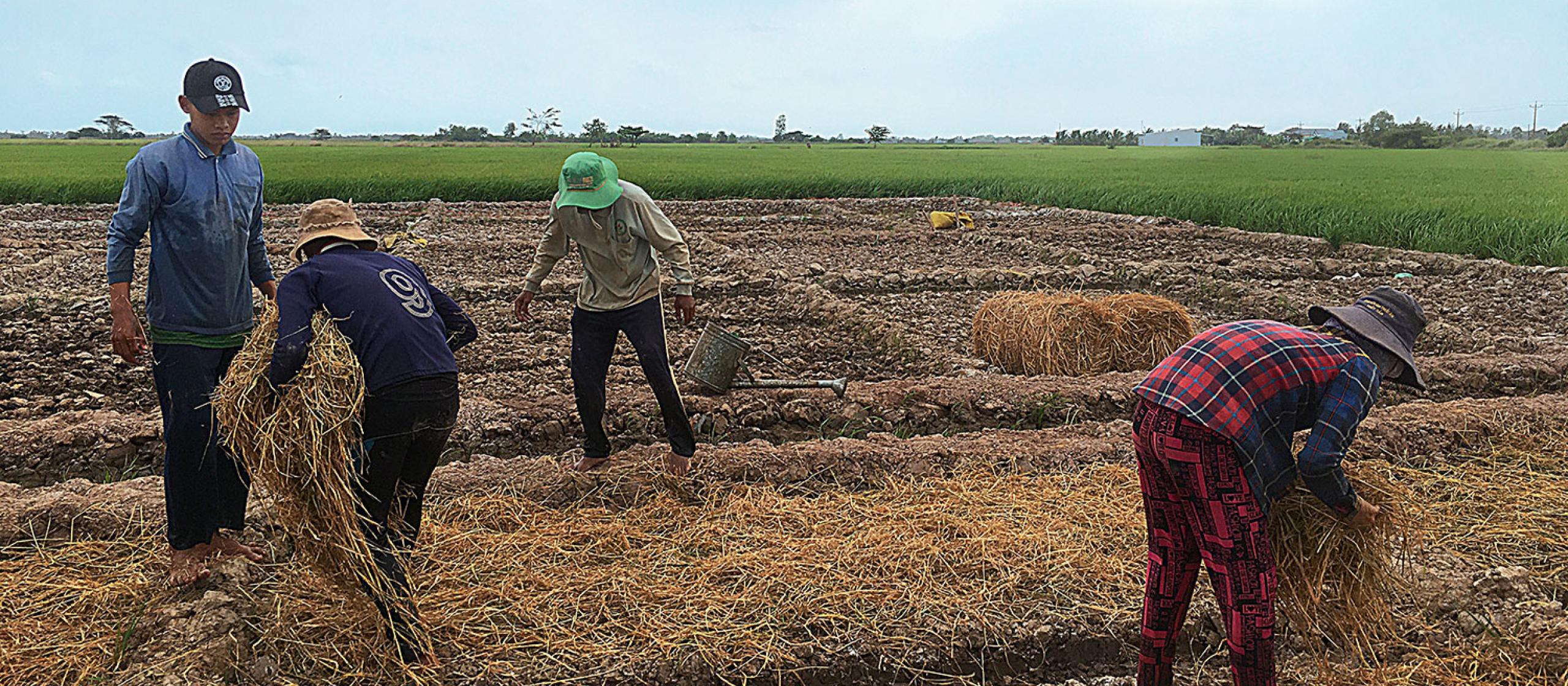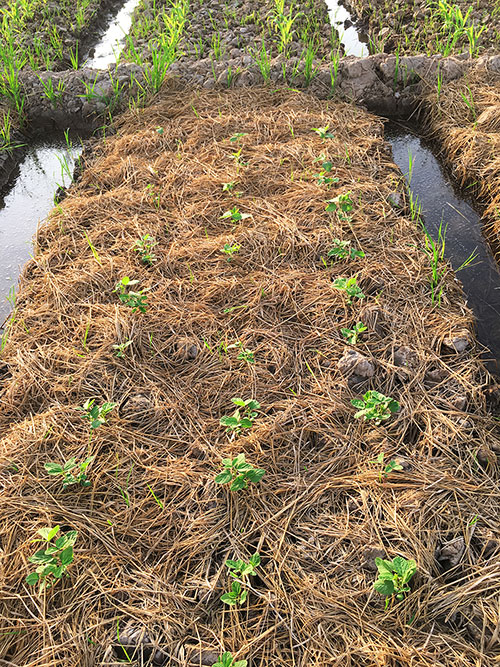- HomeHome
-
About ACIAR
- Our work
- Our people
-
Corporate information
- ACIAR Audit Committee
- Commission for International Agricultural Research
- Policy Advisory Council
- Agency reviews
- Executive remuneration disclosure
- Freedom of information (FOI)
- Gifts and benefits register
- Information publication scheme
- List of new agency files
- Contracts
- Legal services expenditure
- Privacy impact assessment register
- Commonwealth Child Safe Framework
- Benefits to Australia
- Careers
- 40 years of ACIAR
-
What we do
- Programs
- Cross-cutting areas
- Resources
- Where we work
-
Funding
- Research projects
- Fellowships
-
Scholarships
- John Allwright FellowshipScholarships to study in Australia for ACIAR partner country scientists to have Australian postgraduate qualifications
- ACIAR Pacific Agriculture Scholarships and Support and Climate Resilience Program
- Alumni Research Support Facility
- Publications
- News and Outreach
Date released
26 March 2021
Saline water is creeping further inland in the Mekong Delta, threatening the livelihoods of millions of farmers and, more broadly, food security in Vietnam’s critically important ‘rice bowl’. While the Delta’s coastal region and surrounding areas have, to varying degrees, been subjected to and hence adapted to salinity over the years, there was never such a problem in the areas further inland. That is, not until recently.
‘The Delta has 19 million people there who produce 50% of the country’s food,’ says Dr Jason Condon, a senior lecturer in soil science at Charles Sturt University. ‘As it salinises, the food production of the country suffers.’
Dr Condon leads an ACIAR-supported project that aims to equip local stakeholders with the best soil management and alternative crop options to grow during the dry season when the threat of salinity is greatest. The five-year project started in January 2020.
‘Farmers know things have changed and they want to work with us to help find the best way forward,’ says Dr Condon.
Salinity is increasing in the Delta for several reasons, including because there’s less fresh water flowing downstream to the Delta and more saltwater intruding into the system. The year 2016 was a particularly bad year. Farmers who had never experienced saline conditions before were suddenly forced to grapple with up to 70% of their rice being affected by salt and 30% of their crops dying, yielding no grain. Last year, 2020, also brought severe drought and salinity events amidst the global COVID-19 pandemic. That year the Vietnamese Government estimated production losses to be roughly 460,000 hectares and approximately 200,000 households lacked safe water for domestic use.
To help farmers adapt to these new conditions, Dr Condon is working with his project partners across Australia and Vietnam.
Field trials and glasshouse experiments have also been launched to identify suitable crops and soil management practices. The researchers are looking for crops like quinoa, tomatoes, beetroot and soybean that have most, if not all, of the following three main characteristics: efficient water use to minimise the need for irrigation, salt tolerance, and a shorter growing period so that the crop can quickly be harvested before salinity issues inevitably set in.
In terms of soil management strategies, the researchers are looking at both improved irrigation methods and mulches which can minimise evaporation, keeping the soil wetter for longer and reducing damage to crops even if there is salinity. The researchers are also testing the timing of sowing with a few different crops. One of the big challenges farmers are facing is changing the timing of cropping events so that production can be optimised, says Dr Condon.
But, once data has been gathered on current and future predictive levels of salinity, potential alternative high-value crops and effective soil management options, Dr Condon says private-sector investment and government interest will grow, resulting in larger socio economic benefits for the overall Delta.
‘That sort of information is useful to the private sector because it gives it confidence in investment in the supply chain of new crops. The information is also useful to the government in terms of policy changes so it can look at incentives for companies to come into the areas,’ says Dr Condon. ‘Providing crop options that foster investment into rural communities helps provide opportunities for locals so the young people don’t have to migrate to the city to look for work.’
In order to make the supply chain sustainable, one thing the team has observed from its past work in the Delta is the need for post-harvest production facilities, such as mills or canneries, which can extend the life cycle of any alternative high-value crops, thereby flattening the supply curve.
While the project was not designed to create post-harvest products, Dr Condon says thinking about it is important because it tests some of the project’s key research questions, mainly: What crucial factors must an industry have for it to be successful and sustainable in the Delta? To help answer this question the researchers are analysing the strategies of successful local companies like the Loc Troi Group, which specialises in plant production services for horticultural crops and rice, and ANTESCO, a fruit and vegetable producer and exporter.
The researchers are also putting a strong emphasis on gender—specifically, the role gender plays in the gaining and transfer of knowledge that can possibly lead to changes in farmer practices. In Vietnam, men and women on farms play different roles, with women being much more market focused. ‘So, they probably are more receptive to changes in cropping patterns and post-harvest production,’ says Dr Condon.
Still, not all Vietnamese farmers believe there’s a problem with salinity. The project covers four provinces in the Delta, out of which some farmers have been hard hit by salinity and are very concerned about the issue, while many of those residing furthest inland have yet to be impacted by salinity and therefore don’t view it as a problem.
Providing crop options that foster investment into rural communities help provide opportunities for locals so the young people don’t have to migrate to the city to look for work.
Dr Jason Condon.
‘There’s a bit of a disconnect there,’ says Dr Condon, ‘and local farmers generally don’t plan past three years into the future.’ So the researchers intend to take those living inland to see the challenges downstream areas are facing. ‘One province can hopefully learn from the next, because the future’s just downstream,’ says Dr Condon. This idea of a field visit—like many others in the project—originated from the Vietnamese Department of Agriculture and Rural Development.
Climate change will require even bigger changes in food systems in parts of the Mekong Delta as a consequence of the increasing intensity and frequency of extreme weather events resulting from climate change. Aware of this issue, ACIAR recently launched a new Climate Change Program dedicated to creating the pathways for transformation.
‘To date, ACIAR projects like Dr Condon’s have largely been focusing on incremental changes or strategic diversification in current food and livelihood systems to cope with current climate change,’ says Dr Veronica Doerr, the Research Program Manager for Climate Change at ACIAR. ‘But as salinity increases and parts of the Delta go under water, we need to think about the very different food and livelihood systems needed and start the transition for how to get there.’
Dr Doerr says what’s important about transformation is a shift from asking questions like ‘How can I do what I’m already doing better?’ towards questions such as, ‘How can I do something quite different to match the environment that’s coming my way?’ In the Mekong Delta, this includes identifying and seizing new development opportunities associated with sustained salt and brackish water, as highlighted in the new draft master plan for the Mekong Delta 2021–30 and vision to 2050. Dr Doerr says it is essential to plan these bigger shifts early but use monitoring and learning to adjust adaptively over time.
‘Often we’re not really monitoring the right things to know when a big change is needed, and our cycles of learning take a very long time to play out,’ says Dr Doerr. ‘The data we collect influences policy sometimes 30 years into the future. We need to reduce that time window a great deal.’
As for Dr Condon, he says new dry season crops can be a critical stepping stone on the way to transformative changes. Learning can also be accelerated by sharing lessons with other countries like Bangladesh that are experiencing similar climate impacts.
‘In as far as the problems of sea-level rise and climate change impacting farms go, the Mekong is probably one of the worst deltas so we are ahead of the game in a way,’ says Dr Condon. ‘We should take this opportunity to show other countries what their future’s going to look like.’
Dr Condon and his colleagues plan to hold a symposium in Vietnam so that relevant stakeholders from countries around the region can visit the project’s field sites and learn best practices from the project’s local partners. ‘That way the Vietnamese researchers become the South-East Asia experts on the topic. There’s a lot of learning to be had from Vietnam and other places.’
Key points
- Climate change is exacerbating the issue of salinity in the Mekong Delta, threatening food production and food security in Vietnam.
- An ACIAR-supported project is exploring crop and soil management options for farmers affected by salinity.
- As sea-level rise and saltwater intrusion continue to increase, larger transformative changes may be needed, which the new ACIAR Climate Change Program will explore.
ACIAR project




